City of Moorabbin Theatre Group
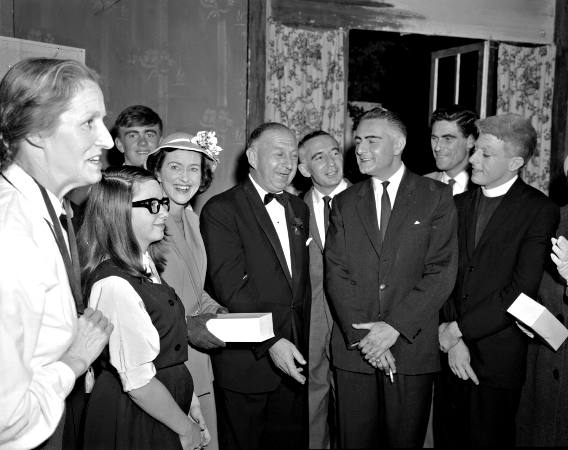
Premier of Victoria, Mr H E Bolte with his wife as guests at the Moorabbin Theatre Group’s performance of The Happiest Days of Your Life, 1963. Courtesy Leader Collection.
The play was ‘The Happiest Days of Your Life’ a three act comedy by John Dighton staged on 9 May 1963. It was the first full length production of the embryonic drama club calling itself the City of Moorabbin Theatre Group. The performance, repeated over three nights, was held in the Brighton High School Hall in Marriage Road, East Brighton. Produced by Joyce Symes it had a cast of thirteen actors. The opening night was a great occasion with the attendance of the Premier, the Honourable Henry Bolte, and his wife, the Mayor of Moorabbin, Cr Ken Hodgson, and the mayoress, local members of parliament and councillors. Robert Harris Suggett the president of the group said it was a ‘unique occasion’.
While that performance was an early highlight for the group it was not the beginning. The formation of a drama group was first mooted with an inaugural meeting of interested people taking place at Brighton High School on 18 October 1962. That meeting of approximately fifty people indicated there was sufficient support to form an active drama society. A committee of twelve individuals was formed with John Oldfield elected as secretary, and Robert Suggett as president. Other members of the committee were Peg Morgan, Vice President, Bert Simpson, Vice President, together with Fr Lang, Grace Shipston, Judy Symes, Aileen Graham, Eileen Coombs, Judy Oliver, F Phillipson, and J Strong. Suggett, born in St Arnaud in 1911, was the representative of the Moorabbin electorate in the Victorian parliament, having held the position since 1955. A former bank officer with the Bank of New South Wales he had strong interests in local organisations as well as in repertory theatre. His association with the City of Moorabbin Theatre Group continued until his death in 1982.
The group described its intention to present several major productions each year in addition to meeting monthly for play readings, discussions and talks on various aspects of theatre. [1] It was made clear there was plenty of activity and scope for members of all ages and skills as actors, set designers and painters, costume or make-up experts, lighting and effects specialists, ticket sellers or front of house supervisors. One of the early play readings was ‘It’s Autumn Now’ with Eric Dyerforth, Eileen Coombs, Dorothy Hammer, David Griffith, Phyllis Scott and Maureena Brazel. Others followed including ‘Behind Lace Curtains’ with Grace Shipston, Phyllis Scott and Harry Summers. ‘Five Birds in a Cage’ was performed at the invitation of the Cheltenham Sets and Crafts Society. It was produced by Bob Suggett who played one of the parts. Suggett also took part in ‘Home is the Hunted’ along with Lorraine Lee, Barbara Better, Sue Priestley, Peg Morgan and George Rolfe. On another occasion John Watson read a short story by Edgar Allan Poe and Harry Summer read selections from Rudyard Kipling.
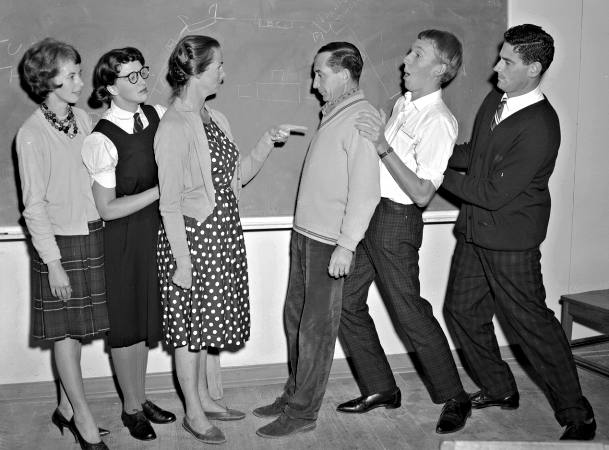
Members of the City of Moorabbin Theatre Group rehearsing a new production. Left to right: Rosalind Andrewartha, Jill Rayson, Barbara Better, John Oldfield, John Watson and Graeme Ewart. Courtesy Leader Collection.
Over the years of its existence the group performed more than a dozen plays. They ranged from ‘fruity melodrama’ through comedy and thrillers to period pieces and psychological drama. During that time critics presented their assessments of the performances of the various casts, making suggestions where improvements could be made and praising the efforts of producers, actors and backstage staff. ‘The Breath of Spring’ by Peter Coke, produced by Barbara Better, was the second production of the group. The Moorabbin News critic acknowledged that there were a good many people in the cast who had acting talent far better than usually found in amateur groups. Nevertheless, he advised ‘one or two members’ not to rush their lines, ‘particularly when the scene was reaching its climax.’ He agreed that this was ‘natural when excitement is high, but it can be irritating to those out front who are on the edge of their seats, anxious not to miss a word but finding that they are missing whole phrases.’ [2]
In contrast in ‘The Day has Gone By’ a reviewer while noting the play placed considerable demands upon the actors in building up the suspense from a leisurely first act through tragedy in the second act to the third act, he questioned the slow delivery of several cast members who, he granted, possibly adopted this mode of presentation in their desire to instil sincerity into the interpretation. Despite this he acknowledged the cast succeeded in holding the attention of the audience on a cold night; an achievement in itself. Named actors in the review included Frances Rogerson ‘who captured the character of the whining first wife, but could have introduced a little more light and shade.’ Both Melvyn Black and Charles Easdown gained confidence as the play progressed and Rosie Spiller achieved a warm reality as the second wife. [3] Another reporter was much harsher in his comments. The play itself, he thought, was made up of a dreary and uninteresting lot of characters and a cast of almost unrelieved monotony. He went on to write, ‘It’s hard to sympathise with a group that chooses this sort of trite material in the hope of building a following.’ [4]
The Heiress, a stage adaption by Ruth and Augustus Goetz on Henry James novel Washington Square, was produced by Anne Crocker at the East Bentleigh Hall in April 1964. It was the costumes of this historical drama, the responsibility of Val Maxwell, which caught the eye of one reviewer. Some were genuine period pieces obtained from the Brotherhood of St Laurence collection while others were specially designed or adapted for the production. Barbara Better wore an elaborate gown of cherry red while Robyn Tilley was dressed in frivolous pastels. Mrs Rogowski of Rogowski’s Art Gallery in South Road Moorabbin provided technical advice about the set as well as lending several ‘lovely pieces to add authenticity to the set’, the report said. [5] The make-up of John Watson in the role of Dr Austin Sloper was praised suggesting no one would have guessed that he was only eighteen. But John was advised to take care with his delivery of lines, for at times the words were lost in his whiskers. George Worhurst played the role of the handsome, impoverished, scheming lover, a role not usually sought by amateur males, and at time his wooing seemed to lack a little ardour. But the criticism was softened with the comment; George was after all ‘playing the role of a character less interested in the woman than her inheritance.’ However the critic acknowledged, George projected his voice well. [6]
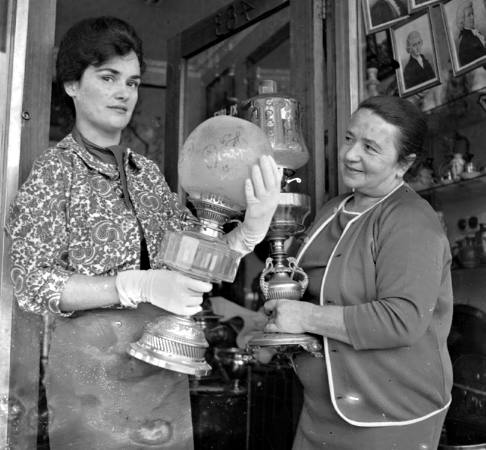
Mrs Rogowski shows Val Maxwell two lamps from her collection. Courtesy Leader Collection.
The Secret Tent by Elizabeth Addyman, produced by Brian Burton, received warm praise from the local critic. The small cast had some meaty material with which to display their acting talents. The critic thought the play called for better than average ability from the players and the audience was well satisfied with the results. He wrote that the play was one to be remembered and talked about as it added one more laurel to the group’s growing collection of successes. Only an Orphan Girl was another production that thoroughly entertained the audience. Described as a ‘fruity melodrama with a plot revolving around the evil intent of the villain to get his hands on the fortune of Nellie, the orphan girl’, the script gave scope to Pam Woolf as the orphan, Joe Brough as the villain and Judy Oliver as the villain’s estranged wife. The audience was given the opportunity to pelt the villain with peanuts at the appropriate moment. The night’s entertainment was further enhanced by the community-singing between acts. John Watson as master of ceremonies had the assistance of Maureena Brazel, Jenny Watson and Jan Ellis, together with the capable piano accompaniment of George Warhurst. Overall, the evening was marked as a ‘smash hit.’ [7]
The production of Mystery at Greenfingers in the East Bentleigh Hall was another that received high marks from a critic for ‘the smooth, almost word perfect performance of the whole cast.’ The producer Peter Oliver was forced to step in to one of the leading roles owing to the illness of one of the actors. In doing so he joined Sue Priestley, Judy Oliver, Peter Fitzpatrick, Fran Mander, George Warhurst, Lorraine Lee, Heather Swift, David Griffith and Rosalind Andrewarth as a member of the cast. The reviewer singled out Rosalind for her superb portrayal of the prying but lively and likeable spinster. However, he acknowledged that all performed with sureness and greater aplomb than had seen in earlier shows making it unfair and difficult to select three or four best players from among them.[8]
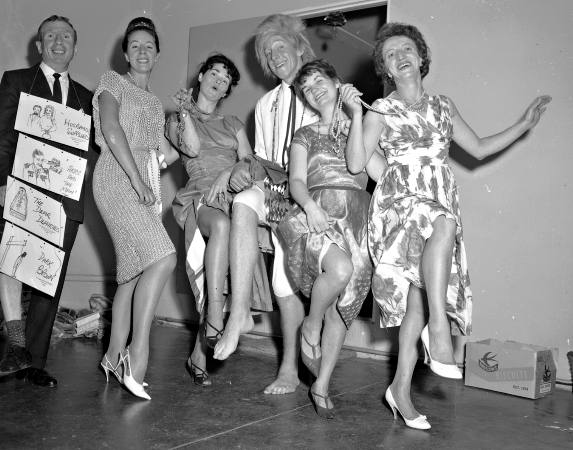
Impromptu can-can by members of the City of Moorabbin Theatre Group. (left) Harry Summers, Jenny Watson, Val Maxwell, John Watson, Fran Mander, Anne Crocker. Courtesy Leader Collection.
Another presentation produced by Peter Oliver was By the Seaside, an hilarious comedy written by Leslie Sands. On this occasion Peter received a little more criticism. The reviewer felt that more could have been expected from the actors who displayed a confident stage presence. A greater sense of character ‘would have lifted the droll tale of a dreary English boarding house on to the farcical level. There was too little contrast between Peter Oliver and the primly proper mum played competently by Judy Oliver,’ he believed. Aileen Graham as the battle axe landlady was praised for giving the action a much needed dash of colour. [9] Another report in the local newspaper suggested it would take a super critical eye to find fault with the performance and declared the audience regarded it as sheer pleasure.
Over the years, in addition to the regular performances presented to audiences in the East Bentleigh Hall, the group also entered in several drama competitions. In September 1964 the group’s entry in the Victorian Drama League Festival was presented by an all female team. The play ‘Finger of Fate’ a one act ghost drama produced by Joyce Symes was presented by Barbara Better, Maureena Brazel, Fran Mander, Peg Morgan and Aileen Graham. The adjudicator was Richard Baynon, a playwright. He commented that the play did not quite achieve the necessary tense, ghostly atmosphere but the performers did well. Suburban Requiem and The Dover Road were two entries in the Moorabbin Arts Festival in different years. Bob Suggett produced the latter play by A A Milne and also took a leading role in this whimsical comedy. The cast included Pam Woolf, George Warhurst, Rosalind Webb, Peter Oliver and Andres Noble.
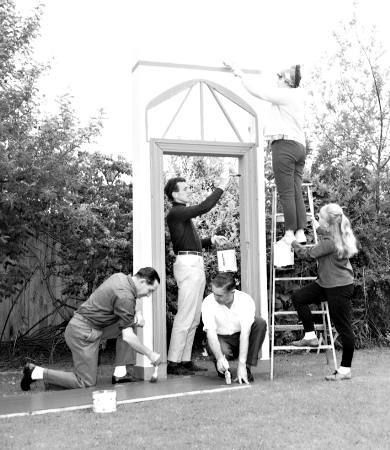
A working bee preparing the set for ‘Dover Road’. John Oldfield (left), Bob Suggett (centre), Andrew Noble (painting doorway), Kay Beaven (up ladder) and Heather Swift. Courtesy Leader Collection.
Since the early days in the 60s when members of the group enjoyed performing in the plays, undertaking play readings, or working out front or behind the scenes, many more plays were produced. Gradually there was a noticeable change in commitment. Many of the early enthusiasts had moved from the district, assumed new responsibilities which left them little time to engage in theatrical productions, or in some instances had died. The number of active members had decreased and the size of audiences had declined in a world where television dominated. After some years members decided to wind up the group. This demise in the local arts scene was mourned by some but others recalled the fun that had been had, the skills and confidence developed, the friendships made and the audiences that had been entertained. Perhaps in the future people will realize what they are missing and a similar group will be formed to join other theatre groups existing in the City of Kingston.
Footnotes
- See Program Notes 1967.
- Moorabbin News, 6 November 1963.
- Moorabbin News, 15 June 1966.
- Moorabbin Standard News, 15 June 1966.
- Moorabbin Standard News, 8 April 1964.
- Moorabbin Standard News, 8 April 1964.
- Moorabbin News, 8 December 1965, Listener In TV 10 December 1965.
- Moorabbin Standard News, 1964.
- Moorabbin News, 3 April 1965.
